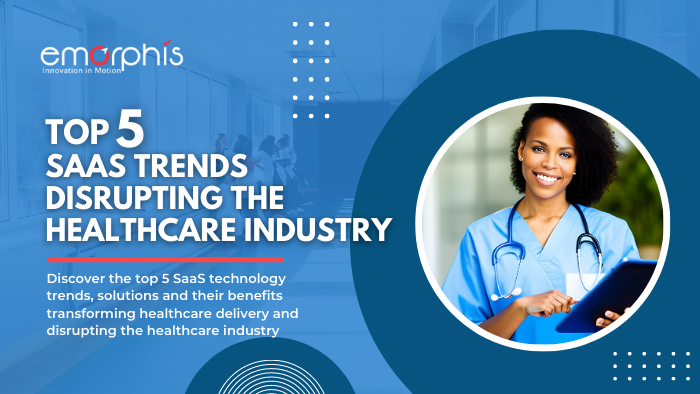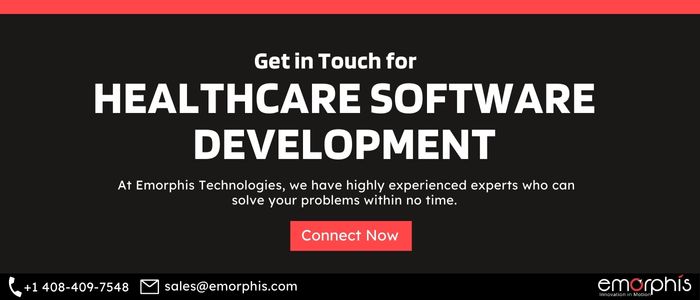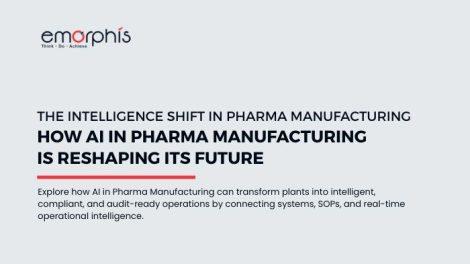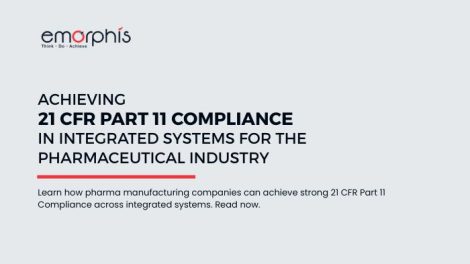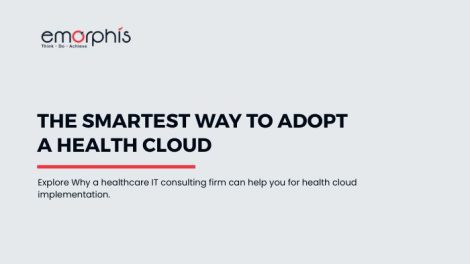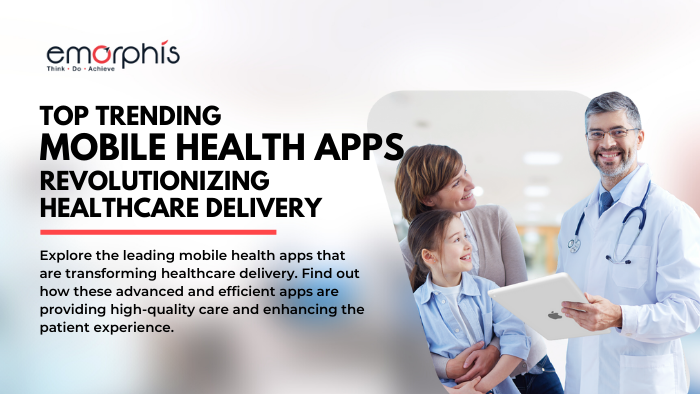The healthcare industry is rapidly evolving, and technology has become integral to its growth. One of the most significant technological advancements in recent years has been the rise of Software-as-a-Service (SaaS) solutions in the healthcare sector. SaaS solutions in healthcare have transformed the way healthcare providers manage patient care, streamline administrative tasks, and improve patient outcomes.
As a matter of fact, SaaS solutions refer to cloud-based software applications development allowing healthcare providers to access and manage data and applications remotely, without needing on-premises hardware or software. SaaS solutions offer several benefits to healthcare providers, such as cost savings, increased flexibility, scalability, and improved security.
In recent years, the healthcare industry has been under immense pressure to reduce costs and improve patient outcomes, and SaaS solutions have emerged as promising solutions to meet these challenges. SaaS solutions can help healthcare providers improve patient care by providing real-time access to medical records, enabling remote consultations, and facilitating patient engagement.
In this article, we will explore some of the most popular examples of SaaS solutions in healthcare, and their benefits.
Top 5 Trending SaaS Solutions in Healthcare Industry
1. Smart AI Solutions
With advancements in machine learning and data analytics, AI is transforming every aspect of healthcare. In fact, it’s right from diagnosis and treatment to patient care and research.
In medical diagnosis, AI algorithms are in use that can quickly analyze medical images. Such as X-rays, MRIs, and CT scans, to detect abnormalities and identify potential diseases. This enables doctors to make more accurate and timely diagnoses. Hence, as SaaS solutions in healthcare, it can lead to better treatment outcomes and improved patient care.
AI is making a significant impact on drug discovery. Pharmaceutical companies are able to process vast amounts of data and identify new drug candidates much more efficiently. This means that new drugs can be ready for the market faster and in fact at a lower cost. Hence, it will potentially save lives and reduce healthcare costs.
Experts forecasted that the global market of AI in Healthcare would be worth almost $188 billion US dollars by 2030. Smart AI solutions for SaaS solutions in healthcare are going to transform healthcare in the future, improving patient outcomes and streamlining healthcare delivery. With continued advances in machine learning and data analytics, we can expect to see even more exciting developments in the coming years. As a matter of fact, it ultimately leads to a healthier and more prosperous society.
2. Amplified need for API connections
APIs, or application programming interfaces, are essentially a way for different computer systems to communicate with each other. In healthcare, APIs can facilitate the sharing of patient data. That is between different providers, as well as between providers and patients themselves.
The need for API connections in healthcare has been amplified in recent years due to several factors. One of the most significant is the growing emphasis on patient-centered care. Patients are increasingly developing an interest to access their own health data. In fact, APIs can enable this by allowing patients to connect with their healthcare providers and access their own health records in a secure and convenient manner by browsing SaaS solutions in healthcare.
Another factor driving the need for API connections in healthcare is the push for interoperability. Interoperability refers to the ability of different computer systems to communicate and share data with each other. In healthcare, interoperability is essential for ensuring that patient data can be shared seamlessly between different providers, hospitals, and clinics.
Healthcare providers and patients alike continue to embrace technology in the future. And in this APIs will play a crucial role in facilitating the secure and efficient sharing of health data for building robust SaaS solutions in healthcare.
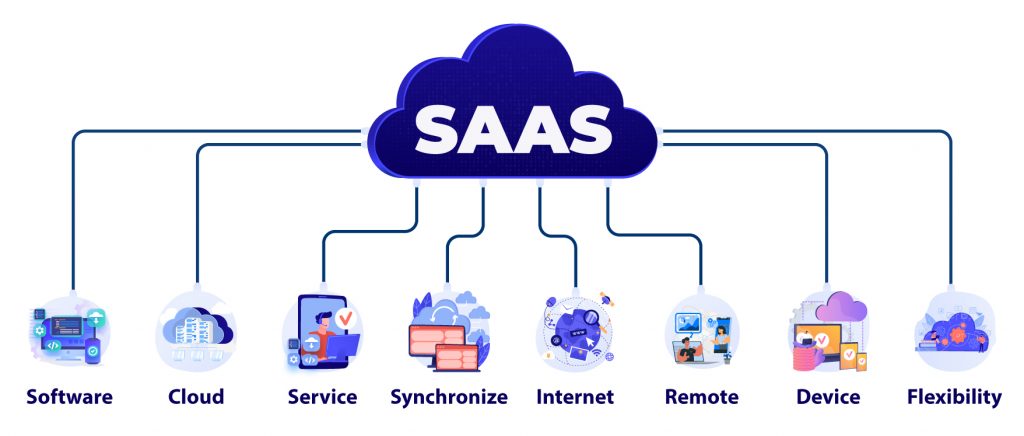
3. Vertical SaaS
Vertical SaaS is a type of software that is specific to a particular industry or vertical. In the SaaS solutions in healthcare industry, vertical SaaS has been gaining traction in recent years. In healthcare, it can be tailored to the specific needs of healthcare providers. Whether it be hospitals, clinics, or individual practices. This means that healthcare providers can implement software that is specific to help them with various tasks. In fact, tasks include patient management, scheduling appointments, electronic health record (EHR) management, and also billing, among others.
There are many different types of vertical SaaS solutions in healthcare. And in the future, we can expect to see even more innovation in this area. For example, telemedicine platforms that enable healthcare providers to deliver care remotely will continue to grow in popularity. These platforms can help to improve access to care for patients. Also to those who may not have easy access to a physical healthcare provider.
Vertical SaaS in healthcare is set to revolutionize the way healthcare providers operate and deliver care. The customization of software to the specific needs of healthcare providers can improve the quality of care and increase efficiency. As a result, with this type of SaaS solutions in healthcare, we can expect to see continued growth and innovation in the coming years.
4. Data As A Service (DaaS)
DaaS, or data as a service, is a cloud-based solution that allows organizations to access and share data over the Internet. DaaS can help healthcare providers better manage and share patient data. With DaaS, patient data is on cloud platforms, making it easily accessible to healthcare providers who need it. This can help to improve patient outcomes by ensuring that healthcare providers have access to the information they need to make informed decisions about patient care.
Experts say that the global market size for DaaS is valued at US$ 8562.4 Million in 2022. The rapid adoption of cloud services globally is a factor to drive market growth. Keeping this into account, the compound annual growth rate is projected to be 23.2% between 2022 to 2032, increasing the figure to US$ 68724.9 Million By 2032.
DaaS in healthcare is set to revolutionize the way healthcare providers access and share data. With the ability to improve patient outcomes, increase efficiency, and enhance data security. We can expect to see continued growth and innovation in this area in the years to come.
5. Migration to PaaS
PaaS, or platform as a service, is a cloud-based solution that provides developers with a platform for building, deploying, and managing software applications.
One of the main benefits of PaaS in healthcare is that it can help healthcare providers to develop and deploy software applications more quickly and efficiently. With PaaS, developers can build and test applications in a cloud-based environment, without the need for expensive on-premise hardware. This can help to reduce the time and cost of software development. Which can be critical in the fast-paced healthcare industry.
There are many different types of PaaS in healthcare. And in the future, we can expect to see even more innovation in this area. For example, we can expect to see the use of PaaS in healthcare data management. In fact, it can help healthcare providers to better manage their data in a cloud-based environment. With PaaS, healthcare providers can store and manage data securely, and easily integrate data into their software applications.
Get in touch for healthcare app development services
Benefits of SaaS Solutions in the Healthcare Industry
SaaS solutions have become a game-changer for the healthcare industry. In fact, it is offering numerous benefits that have revolutionized the way healthcare providers deliver care to their patients. Let’s explore some of the key benefits of SaaS solutions in healthcare:
a. Increased efficiency and productivity
SaaS solutions in healthcare help healthcare providers streamline administrative tasks. Some of them are billing and scheduling and automating repetitive processes, such as prescription refills. This allows healthcare providers to focus more on patient care, improving efficiency and productivity.
b. Improved patient outcomes
SaaS solutions in healthcare provide healthcare providers with real-time access to patient data, including medical histories, test results, and treatment plans. This enables healthcare providers to make more informed decisions about patient care, resulting in improved patient outcomes.
c. Scalability
SaaS solutions in healthcare are highly scalable, allowing healthcare providers to quickly adapt to changing patient needs and business requirements. This flexibility is particularly useful during peak periods, such as during a pandemic or flu season.
d. Enhanced security
SaaS solutions in healthcare often have multiple layers of security, including data encryption and access controls. In turn, it helps to protect patient data from unauthorized access or breaches.
The figures may show some significant changes, but the recent report by Bloomberg encoded that the global Software as a Service market size is projected to reach $700 Billion by 2030, growing at a CAGR of 18.82% from 2021 to 2023. According to the report, factors such as increased adoption of smartphones, app-based services, and public & hybrid cloud platforms. Also, Artificial Intelligence (AI) & Machine Learning (ML), integrated software across multiple industries provide opportunities for market growth in the future.
SaaS solutions in healthcare have transformed the healthcare industry. In fact, by making it easier for healthcare providers to manage patient care, streamline administrative tasks, and improve patient outcomes. As the healthcare industry continues to evolve, we can expect to see further advancements in SaaS solutions in healthcare. As a matter of fact, that will continue to benefit healthcare providers and their patients alike.
The Bottom Line
As technology continues to evolve, we can expect to see even more innovation in the healthcare industry. In fact, exciting new SaaS solutions in healthcare will help healthcare providers to improve patient outcomes, reduce costs, and increase efficiency.
The healthcare industry in the future is set to experience a transformative period. In fact, innovative SaaS solutions in healthcare changing the way healthcare providers operate. With efficient healthcare software development, healthcare integration services, and deployment. Also with, greater access to data and improved collaboration. We can expect to see healthcare providers delivering better care to patients than ever before. As we look to the future, the potential for SaaS solutions in healthcare is limitless. In fact, we can expect to see even more ground-breaking developments that will continue to change the industry for the better.
For more, take a look at our insights into Healthcare



